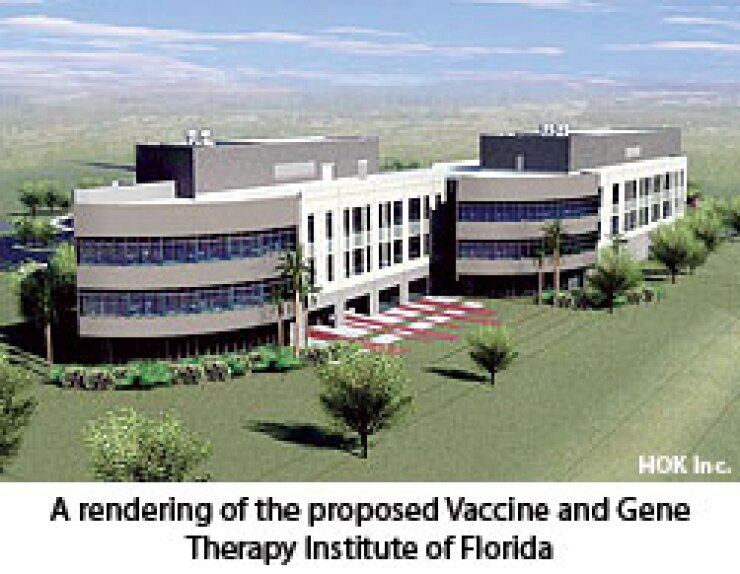
BRADENTON, Fla. — Dr. Rafick-Pierre Sekaly and other scientists at the Vaccine and Gene Therapy Institute of Florida are looking for "nothing short of cures" when it comes to diseases such as HIV, swine flu, and the West Nile virus, says the institute's chief operating officer, Mark Williams.
Sekaly, a prominent scientist who has made recent discoveries about HIV, participated in a call to prospective investors explaining VGTI's goals and why the new division of Oregon Health and Science University is selling $69 million of tax-exempt bonds to finance a 99,000-square-foot research facility on Florida's east coast.
Some investors asked why the debt is being sold this week by the Southern Grove Community Development District, given that a number of traditional CDDs in Florida are experiencing severe financial troubles and some have even defaulted on their bonds.
Southern Grove is not a traditional CDD.
It is believed to be the first of its kind in Florida to finance a nonprofit research institute's facility, which is being built in a biomedical research park in Port St. Lucie about 50 miles north of West Palm Beach.
Southern Grove is only acting as a conduit similar to the way other agencies issue bonds such as hospital districts and industrial development bond districts, said Hank Fishkind, president Fishkind & Associates Inc., the CDD's financial adviser and manager. VGTI bond payments are based on a lease agreement between the issuer and the lessor, he noted.
"This is a lease deal so it's quite different than the typical CDD deals that are assessment based for the development of land," said Fishkind, who has also been involved as financial adviser or manager on many traditional CDDs. "This is a lease deal for vertical construction of a building and equipment for a medical lab for a successful biomedical science entity."
The bonds shouldn't be tainted merely because they are being issued by a community development district, said Jay Abrams, chief municipal credit analyst at FMSBonds Inc.
"It's a CDD in name only, therefore this will be judged on its own merits," he said. "I think a lot of the questions will be about the start-up nature of the facility and that they have to meet a number of different thresholds over time as far as jobs in order to keep the financial aid that's coming in from the state. They did get an investment-grade rating from Standard & Poor's."
Standard & Poor's assigned a BBB-minus rating and a stable outlook to the bonds.
The rating was based partly on the $60 million start-up grant that VGTI received from Florida's Innovation Incentive Program. The grant is not subject to appropriation and is based on a funding agreement with limited contract risk, according to a report by Standard & Poor's analyst Song Hahn.
Other factors for the investment-grade rating included solid management with experience successfully establishing and running a similar research institution, oversight and support from Oregon Health and Science University, recruitment of world-class scientists with a good record of securing federal and private grants, and collaborative relationships with other research and health institutions.
Hahn said offsetting factors included no operating history with unpredictable grant revenue along with substantial needs for initial investment, contractual obligations and covenants in the funding agreement, and a high level of debt with annual debt service of $6 million representing 16% to 21% of projected total annual disbursements for the first 10 fiscal years.
"VGTI is really not a start-up so much as it is a continuation of research going on in Oregon," Williams said in an interview Monday. "Oregon focuses on animal research. Here in Florida we're focusing on human clinical testing."
VGTI ultimately will "bring 200 full-time, well-paying jobs to the Treasure Coast," which is considered a key piece of Florida's development of the bio-technical sector, Williams said.
While waiting for its own building to be constructed, VGTI currently is operating for free from the Torrey Pines Institute for Molecular Studies, one of several anchors in Port St. Lucie's research park along with the company.
"We're looking at a very attractive setting for the future of research in Florida," Williams said. "Our scientists are seeking to improve the human condition by using the body's own immunization system and enhancing that system so we move away from curing diseases by bombarding the body with chemicals."
Prager, Sealy & Co. is underwriting the bonds being sold this week.
Ruden, McClosky, Smith, Schuster & Russell PA is bond counsel. Underwriters' counsel is Greenberg Traurig PA.





